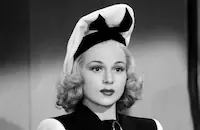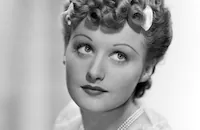D.O.A.

Brief Synopsis
Cast & Crew
Rudolph Maté
Edmond O'brien
Pamela Britton
Luther Adler
Beverly Campbell
Lynne Baggett
Film Details
Technical Specs

Synopsis
In Los Angeles, Frank Bigelow enters a police station to report that he was poisoned the previous night in San Francisco and will soon die. Upon questioning by the police chief, Frank recounts the events that led him to this fateful moment: Two days earlier in Banning, California, Frank, a notary and tax consultant, bids farewell to his secretary and girl friend, Paula Gibson, departing for a short vacation to San Francisco. When Frank arrives at his hotel, Paula telephones to tell him that Eugene Philips, of Philips' Import and Exporting Company, urgently needs to speak with him and refuses to leave a message. That evening Sam Haskell, a guest in the room opposite Frank's, invites him to a party which eventually ends up at a bar on the Embarcadero. In the bar, Frank leaves his drink momentarily unattended and a shadowy figures replaces it with another without Frank's knowledge. Frank drinks from the glass, noticing a strange taste, but nothing more. The next morning Frank feels vaguely ill and is eventually disturbed enough to go to a medical center for an examination. After several tests, the doctor informs Frank he has ingested a fatal amount of luminous toxic poison that will kill him in the next few days. Panicked, Frank goes to another hospital where he receives the same prognosis. Frantic to find out why he has been poisoned, Frank returns to the Embarcadero bar, which is closed, then looks for Haskell, who has already checked out. Later, Paula telephones again and informs him that Philips, the man trying so desperately to contact him, died the day before. Driven by an impulse, Frank goes to Philips' Los Angeles office, where his secretary, Miss Foster, tells him that Philips committed suicide by jumping from the balcony of his highrise apartment. The company controller, Halliday, claims no knowledge of why Philips sought to speak to Frank. Frank then goes to see Philips' widow and brother Stanley, but both are evasive, although Stanley does explain that his brother had sold a rare form of iridium, a luminous toxine, and faced possible imprisonment, which drove him to suicide. Back at the hotel, Paula again telephones Frank to say she has discovered that some months prior, Frank notarized a bill of sale of iridium from a George Reynolds to Philips. Returning to question Mrs. Philips, Frank discovers that both the bill of sale and Reynolds have disappeared. Believing that all evidence of the sale is being systematically eliminated, Frank thinks he has the motive for his poisoning and is determined to find the culprit. Convinced that Philips was also murdered, Frank again questions Miss Foster, who reveals that on the day of his death Philips saw Marla Rakubian, a model and former girl friend. Frank goes to see Marla and accuses her of being in league with Reynolds, then takes a portrait picture she has of Reynolds. Frank tries to locate Reynolds through the portrait studio, but instead discovers Reynolds' real name is Raymond Rakubian. When he goes to see Reynolds at the address provided by the photographers, Frank finds an abandoned warehouse and is fired upon. After returning to Philips' office, Frank is kidnapped by Chester, a henchman of Reynolds' gangster uncle, Mr. Majak, the illegal purchaser of the iridium. Majak insists that his nephew cannot be connected to the murders as he has been dead for five months. Frank escapes from Majak, and goes back to Philips' office where Stanley, who has just been poisoned by Halliday, gives him evidence that the controller and Mrs. Philips had been having an affair for over two years. At her apartment, Mrs. Philips admits that her husband had just discovered the affair and fallen from the balcony in a struggle with Halliday. The critical bill of sale proved the original transaction was legal and was not motive for a suicide. Believing Philips had succeeded in contacting Frank, Halliday poisoned him. Frank returns to Philips' office, finds Halliday and kills him. As he finishes reciting his story at the police station, Frank calls out for Paula before slumping to the floor, dead.

Director
Rudolph Maté
Cast

Edmond O'brien

Pamela Britton

Luther Adler

Beverly Campbell

Lynne Baggett

William Ching
Henry Hart

Neville Brand

Laurette Luez
Jess Kirkpatrick
Cay Forrester
Frank Jaquet
Larry Dobkin
Frank Gerstle

Carol Hughes
Michael Ross
Donna Sanborn
Virginia Lee
Roy Engel
George Lynn
Frank Conlan
Bill Baldwin

Lynne Roberts
William Forrest

Peter Leeds
Ivan Triesault

Philip Pine
George Guhl
Frank Cady
Edwin Chandler

Jerry Paris
Jadie Carson
Douglas Evans
Hugh O'brian
Harold Miller
Von Streeter
Ray Larue
Cake Wotchard
Shifty Henry
Teddy Buckner
Crew
Irving Berns
Duncan Cramer
Mac Dalgleish
Maria Donovan
Edward F. Dunne M.d.
Jack Fuqua
Carl Gibson
Clarence Greene
Gene Hirsch
Ernest Laszlo
Arnold Laven
Marty Moss
Arthur H. Nadel
Joseph H. Nadel
Al Orenbach
Harry M. Popkin
Harry M. Popkin
Leo C. Popkin
Jim Potevin
Russell Rouse
Frank Tanner
Dimitri Tiomkin
Ben Winkler

Videos
Movie Clip



Hosted Intro
Film Details
Technical Specs

Articles
D.O.A.
One of the most imaginative and frenetic entries in the film noir genre, D.O.A. works as both a detective thriller and as a bleak, nihilistic melodrama. Its doomed central character is distinctly different from most protagonists in this genre in that he is completely reckless and often takes dangerous personal risks. But after all, he has nothing to lose since he's a walking dead man anyway. Edmond O'Brien is ideally cast here and author Eddie Muller pays him a fitting homage in his book, The Lost World of Film Noir (St. Martin's Griffin): "Realizing that the convoluted plot is little more than a succession of gab-happy interrogation scenes, director Rudolph Mate gave O'Brien free rein to push the proceedings to a fever pitch. O'Brien responded with a performance more animated than Daffy Duck. He frantically lunges in and out of rooms; you can almost see the animated motion lines poof from the doorframes. He skitters and slides down hallways, outrunning his feet in the best Chuck Jones tradition. O'Brien is so overheated he can't stand still for a moment, lest he drown in a pool of sweat."
D.O.A. was based on Der Mann, Der Seinen Morder Sucht, a 1931 German film directed by Robert Siodmak, which dealt with a dying man's investigation of his forecoming demise. Rudolph Mate stuck to the original premise but adapted a much darker tone that presents a chaotic view of contemporary society. The film also offers two alternate tours of San Francisco and Los Angeles which aren't on any tourist map. These aren't the colorful local attractions you've seen in postcards but noctural glimpses of police stations, waterfront dives, and dark, deserted streets that are inexorably linked like a giant maze with no exit. In 1988, Rocky Morton and Annabel Jankel, the creators of Max Headroom remade D.O.A. with Dennis Quaid as the doomed hero but it was universally panned by the critics and not popular with audiences either.
Of interest to collectors of film trivia is the presence of Diana Barrymore in an uncredited bit part in D.O.A. . The daughter of famous actor and legendary alcoholic John Barrymore, Diana also led a troubled personal life and was at the lowest point in her career when she appeared in D.O.A. She made her final movie appearance the following year - also in an uncredited bit - in The Mob but made a brief comeback effort in 1958 with the publication of her autobiography, Too Much, Too Soon. Despite the book's success, she took her own life in 1960.
Producer: Leo C. Popkin
Director: Rudolph Mate
Screenplay: Clarence Greene, Russell Rouse
Art Direction: Duncan Cramer Cinematography: Ernest Laszlo
Costume Design: Maria P. Donovan
Film Editing: Arthur H. Nadel
Original Music: Dimitri Tiomkin
Principal Cast: Edmond O'Brien (Frank Bigelow), Pamela Britton (Paula Gibson), Luther Adler (Majak), Beverly Garland (Miss Foster), Lynne Baggett (Mrs. Philips), Neville Brand (Chester), William Ching (Halliday).
BW-84m.
by Jeff Stafford

D.O.A.
Quotes
Of course I'll have to notify the police. This is a case for Homicide.- Dr. MacDonald
Homicide!- Frank Bigelow
I don't think you fully understand, Bigelow. You've been murdered.- Dr. MacDonald
Forget the bills. You know that coat you want? Get it.- Frank Bigelow
You ARE drunk!- Paula Gibson
Don't get cute. I'm just itchin' to work you over.- Chester
He's not afraid. You can tell from a man's eyes when he is afraid. Look at his eyes.- Majak
That's the way I wanna see you go, Bigelow... nice and slow.- Chester
Trivia
When Frank Bigelow registers at the Allison Hotel in Los Angeles, the name directly above is is Russell Rouse, one of the writers. Also on the register is Ernest Laszlo, the director of photography.
The scene in which Bigelow runs in panic through the streets after learning he has been poisoned was a stolen shot. The pedestrians had no idea a movie was being made and no warning that O'Brien would be plowing through them.
Notes
At the end of the film, just prior to the cast list, the following written epilogue appears: "The medical facts in this motion picture are authentic. Luminous toxin is a descriptive term for an actual poison." Actress Lynne Baggett's name is misspelled "Lynn" in the onscreen credits. The film marked the motion picture debut of actress Beverly Garland, who was billed as Beverly Campbell. The film was shot on location in and around San Francisco and Los Angeles. According to modern sources, the idea for D.O.A.'s unusual storyline was taken from a 1931 German film, Der Mann, Der Seinen Morder Sucht [The Man Who Seeks His Murderer], directed by Robert Siodmak. An Australian version of Russell Rouse and Clarence Green's story, entitled Color Me Dead, was directed by Eddie Davis and released in 1969. That version, produced by Goldsworthy, starred Tom Tryon and Carolyn Jones. In 1988, a much-altered remake of D.O.A. was produced by Touchstone Pictures. That version retained the original title and was directed by Rocky Morton and Annabel Jankel, and starred Dennis Quaid and Meg Ryan.
Some modern sources erroneously state that D.O.A. was character actor Neville Brand's first film. Although D.O.A. marked Brand's first onscreen billing, he had previously appeared in the 1949 film Port of New York (see below).

Miscellaneous Notes
Released in United States April 21, 1950
Wide Release in United States April 30, 1950
Remake of "D.O.A." (1949) directed by Rudolph Mate.
Completed shooting November 1949.
Remade under the same title in 1988, directed by Rocky Morton and Annabel Jankel.
Selected in 2004 for inclusion in the Library of Congress' National Film Registry.
Previewed in Los Angeles December 22, 1949.
Released in United States April 21, 1950
Wide Release in United States April 30, 1950














